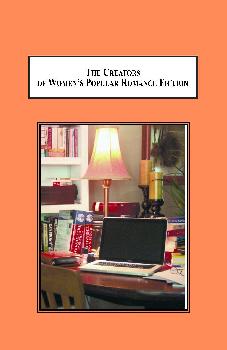This is our backup site. Click here to visit our main site at MellenPress.com
Creators of Women’s Popular Romance Fiction: The Authors Who Gave Women a Genre of Their Own

| Author: | Hall, Glinda F. | |
| Year: | 2010 | |
| Pages: | 244 | |
| ISBN: | 0-7734-3841-6 978-0-7734-3841-5 | |
| Price: | $179.95 | |
This study examines women’s popular romance fiction’s role in constructing gender and revealing power structures, while creating a community heritage for romance writers and readers. The textual analysis incorporates cultural studies and women’s studies by focusing on gender constructs of power through the medium of popular romance fiction and its many subgenres.
Reviews
“. . . this book’s strongest addition to the field of scholarship on romance, popular culture, and feminism is Hall’s analysis of sexuality’s meaning within the genre. [The author] views romance as a popular use of ideas embedded within the alternative though widespread lifestyle of D/s, dominance and submission. Hall analyzes the power dynamics of classics such as Kathleen Woodiwiss’s The Flame and the Flower and Rosemary Rogers’ Sweet Savage Love and recent erotic romances such as Emma Holly’s Velvet Glove for their use of D/s as a vocabulary to deal with larger culture issues concerning power, identity, and desire. Utilizing sophisticated feminist theorists such as Judith Butler and Jessica Benjamin, Hall examines the broader cultural implications of the ways in which women’s romances represent gender and sexuality.”
– Prof. Deborah Chappel-Traylor, Arkansas State University
[The author’s] scholarship exceeds the normal boundaries of cultural studies and lends credence to the important and historical significance of romance writing, a genre that has only changed its boundaries due to the historical foundation of change, from the 1800’s through the current 21st century. Dr. Hall’s research falls into the same lines as that of the impetus that created and actually allowed Austen’s and the Brontes’ works centuries ago. It is an engaging and relevant work.” – Prof. Melissa Whiting, University of Arkansas Fort Smith
“The insights are refreshing, sophisticated, and thought-provoking, especially as Dr. Hall relates the genre to the lived experiences of women through the last two centuries. . . . . The historical context of the work is good—following the “invention” of the genre from its roots in the 19th century is particularly relevant.” – Dr. Joe M. Hardin, University of Arkansas, Fort Smith
[The author’s] scholarship exceeds the normal boundaries of cultural studies and lends credence to the important and historical significance of romance writing, a genre that has only changed its boundaries due to the historical foundation of change, from the 1800’s through the current 21st century. Dr. Hall’s research falls into the same lines as that of the impetus that created and actually allowed Austen’s and the Brontes’ works centuries ago. It is an engaging and relevant work.” – Prof. Melissa Whiting, University of Arkansas Fort Smith
“The insights are refreshing, sophisticated, and thought-provoking, especially as Dr. Hall relates the genre to the lived experiences of women through the last two centuries. . . . . The historical context of the work is good—following the “invention” of the genre from its roots in the 19th century is particularly relevant.” – Dr. Joe M. Hardin, University of Arkansas, Fort Smith
Table of Contents
Preface
Acknowledgements
Introduction:
An Overview
Definition of Terms
Review of Literature
Methodology
Conclusion
1. Popular Romance Fiction’s Use of Power Dynamics in Representing Gender and Sexuality Introduction
A theoretical approach to power relationships and gender identity within popular romance fiction:
Jessica Benjamin’s Bonds of Love
Judith Butler’s Gender Trouble
Emma Holly’s Velvet Glove
Kathleen E. Woodiwiss’s The Flame and the Flower
Rosemary Rogers’s Sweet Savage Love
Conclusion
2. Popular Romance Fiction’s Role in Representing History, Gender and Heritage
Introduction
Historical Romance and Region
Historical Romance and the Myth of the Southern Belle
Emily Toth’s Daughters of New Orleans
Patricia Rice’s Moonlight and Magnolias
Candice Proctor’s Midnight Confessions
Patricia Potter’s Rainbow and Beverly
Jenkins’s Winds of the Storm
Historical Romance and Race
Historical Romance, the South, and Popular Culture
Conclusion
3. A Genre of One’s Own: Popular Romance
Writers and Their Communities
Introduction
Women as Writers
Women as Storytellers
Community and Mentoring
Trends and Shifting Ideologies
Conclusion: Discourse as Power/Power of Community
Bibliography
Appendix A: Index of Taped Interviews and Transcriptions
Appendix B: List of Interview Questions
Appendix C: Survey/Questionnaire for Writers’ Group
Appendix D: Survey of Top Five Choices
Index
Acknowledgements
Introduction:
An Overview
Definition of Terms
Review of Literature
Methodology
Conclusion
1. Popular Romance Fiction’s Use of Power Dynamics in Representing Gender and Sexuality Introduction
A theoretical approach to power relationships and gender identity within popular romance fiction:
Jessica Benjamin’s Bonds of Love
Judith Butler’s Gender Trouble
Emma Holly’s Velvet Glove
Kathleen E. Woodiwiss’s The Flame and the Flower
Rosemary Rogers’s Sweet Savage Love
Conclusion
2. Popular Romance Fiction’s Role in Representing History, Gender and Heritage
Introduction
Historical Romance and Region
Historical Romance and the Myth of the Southern Belle
Emily Toth’s Daughters of New Orleans
Patricia Rice’s Moonlight and Magnolias
Candice Proctor’s Midnight Confessions
Patricia Potter’s Rainbow and Beverly
Jenkins’s Winds of the Storm
Historical Romance and Race
Historical Romance, the South, and Popular Culture
Conclusion
3. A Genre of One’s Own: Popular Romance
Writers and Their Communities
Introduction
Women as Writers
Women as Storytellers
Community and Mentoring
Trends and Shifting Ideologies
Conclusion: Discourse as Power/Power of Community
Bibliography
Appendix A: Index of Taped Interviews and Transcriptions
Appendix B: List of Interview Questions
Appendix C: Survey/Questionnaire for Writers’ Group
Appendix D: Survey of Top Five Choices
Index
